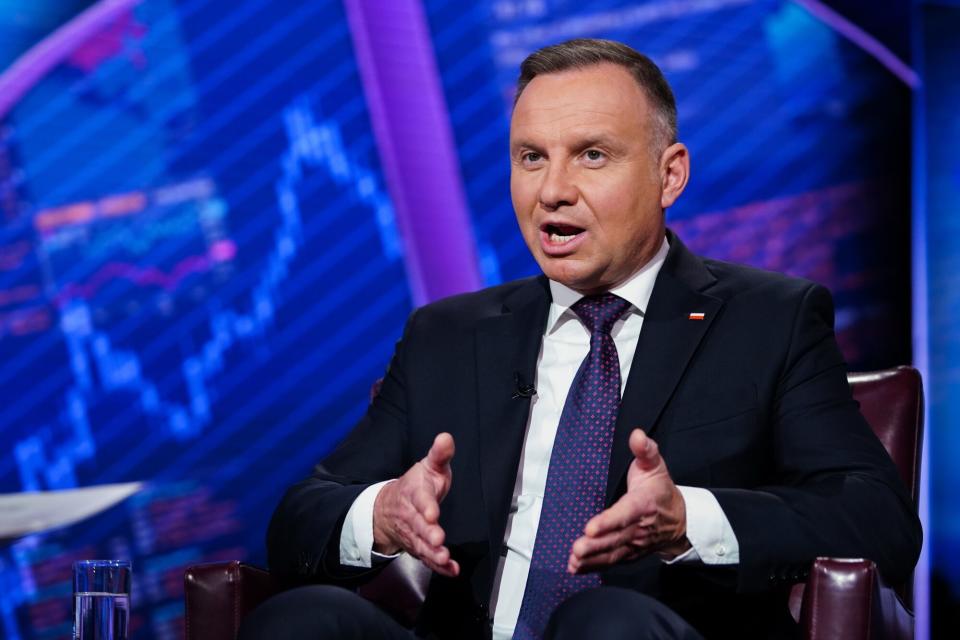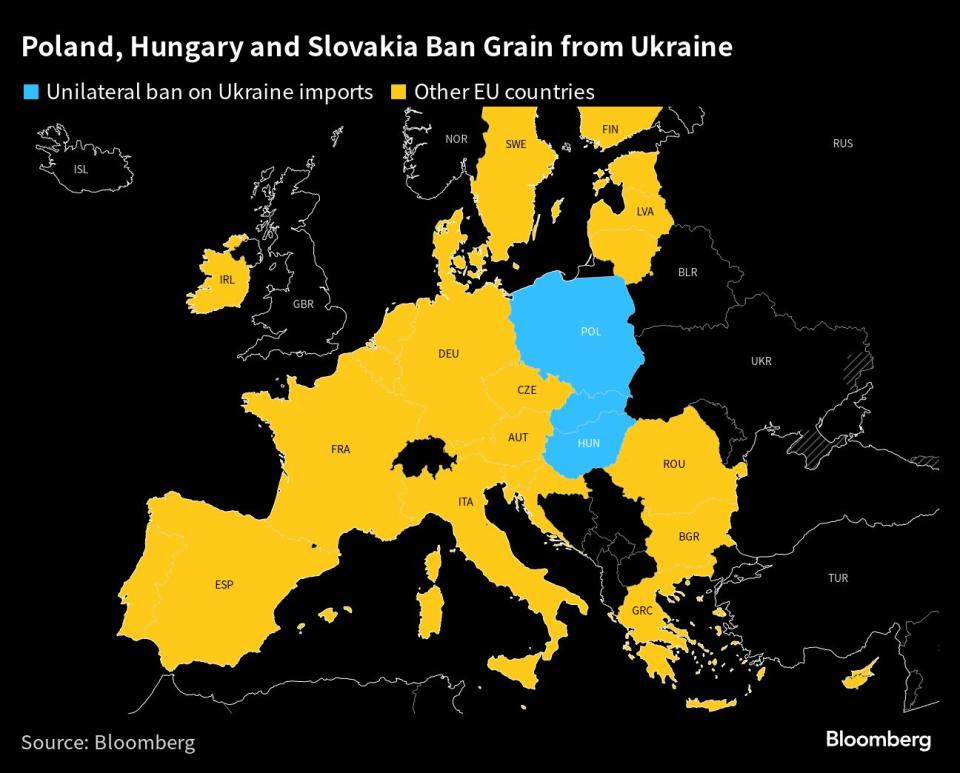Poland’s Duda Makes Dig at Zelenskiy as Their Once-Strong Bond Frays
- Oops!Something went wrong.Please try again later.
(Bloomberg) -- Polish President Andrzej Duda laid into Ukraine’s Volodymyr Zelenskiy over a dispute about imported grain in comments that threaten to wreck an alliance that’s been central to Kyiv’s push to repel Russia’s invasion.
Most Read from Bloomberg
Canada Pulls Diplomats, India Suspends Visas in Escalating Fight
‘Dead Space’ Co-Creator Departs Startup After Newest Game Flops
Ex-Goldman Bankers Make a Fortune With Controversial Bet on Coal
Passalacqua in Italy’s Lake Como Is Named Best Hotel in the World
Vegas’ Newest Resort Is a $3.7 Billion Palace, 23 Years in the Making
Poland has been the primary destination for refugees fleeing the war and about 90% of all the aid and military equipment headed for Kyiv passes through its territory. But Warsaw’s extension of a ban on Ukrainian grain a month before an election has driven a wedge between the wartime allies.
“We cannot allow that Ukrainian grain is sold on the Polish market without any control,” Duda said in an interview Tuesday on Bloomberg Television with Annmarie Hordern in New York. “We also have our own citizens, we have to care for their interest.”
“It’s a pity our Ukrainian neighbors don’t want to understand that,” he said during a visit to the United Nations General Assembly.
Warsaw’s decision to unilaterally extend the grain ban is contributing to an unraveling with Kyiv as Poland’s ruling party seeks to placate restive farmers who are key to an election victory on Oct. 15. Ukrainian officials have bristled at the campaign calculus — and this week filed a World Trade Organization complaint against Poland, Slovakia and Hungary.
Read More: Ukraine Reaps a Big Harvest, But War Risks Trapping It at Home
Duda’s remarks were prompted in part by comments President Zelenskiy made earlier Tuesday on X, the social media platform previously known as Twitter. He accused “some in Europe” of “turning grain into a thriller.”
“They may seem to play their own roles,” Zelenskiy wrote. “In fact they’re helping set the stage for a Moscow actor.”
By Wednesday, the comments had reverberated in Poland, prompting the Foreign Ministry to summon the Ukrainian ambassador and denounce Zelenskiy’s remarks as “untrue.”
The rift culminated in an apparent snub in New York. Duda had planned to meet Zelenskiy on the sidelines of the UN meeting, only to say later that scheduling conflicts made it impossible. Ukrainian officials never confirmed the meeting, according to a person familiar with the protocol, who spoke under condition of anonymity.
‘Regret’ Over Rift
Polish Prime Minister Mateusz Morawiecki raised the temperature further, threatening to add more products to the grain ban if Kyiv escalates. “We will defend our interests with all determination,” he told Polsat News.
Zelenskiy’s allies complain that a promise in April by Polish Morawiecki to avoid a unilateral move on grain was broken by the announcement days later by Law & Justice leader Jaroslaw Kaczynski of the initial ban, according to an official familiar with Kyiv’s thinking.
As Law & Justice struggles to win support beyond its base, Poland’s relationship with Kyiv is now hostage to the election campaign, the official said.
The breakdown is a sharp contrast to the unity that had defined the two leaders’ relationship before the grain dispute, a friendship that seemed to define Poland’s solidarity with Ukraine. They had regular phone conversations in the first months of the war. In April, Duda stood alongside Zelenskiy in Warsaw and vowed that Russia would never drive the neighbors apart.
Read more: Ukraine Files Complaint With WTO on EU Neighbors’ Grain Ban
“Personally, I regret there is a discussion going on in the media,” Duda said. “I’ll try to cut it off for sure, because someone needs to be wiser here, and the situation isn’t easy.”
The back-and-forth signaled that what seemed to be a relatively minor disagreement has ballooned into something larger. Any worsening could have direct implications for the war, given Poland’s role as a key transit point for weapons and aid.
For Poland, the issue is a political one. The ruling Law & Justice party, seeking a third term in office in next month’s contest, is reluctant to alienate its rural base while growing discontent over the cost of supporting Ukraine has boosted the party’s opponents on the far right.
In addition to serving as a major source of military assistance to Ukraine, Poland has accepted about 2 million refugees from Russia’s invasion. In a further ominous sign, Poland’s government said Monday it may not extend support for the refugees next year.
In the interview, Duda said there were “many different problems,” including “people-to-people problems.”
“Of course, there is a phenomenon of a certain fatigue,” he said. “But it’s normal, it’s just human. A lot of Polish people have sacrificed a lot to help their neighbors from Ukraine.”
History of Wars
In a historical context, the division is nothing new: Ukraine and Poland have fought wars dating to the 17th century. A commemoration of the 1943 massacres of Poles in the Ukrainian region of Volhynia this year triggered complaints by Law & Justice officials that Zelenskiy should have apologized for the mass killings.
Ukrainian authorities took a dim view, noting that a formula for reconciliation had been agreed on — and that the issue was artificially being raised again in Warsaw by politicians, an official familiar with the discussions said. Zelenskiy joined Duda at a church service to mark the event in July.
“History should be left to historians and experts and the two countries should think about the future,” Ihor Zhovkva, Zelenskiy’s deputy chief of staff responsible for foreign affairs, said in an interview. “We have a lot in common, despite the difficult history. Today, we have more in common than what separates us.”
--With assistance from Kasia Klimasinska, Andrea Dudik, Michael Winfrey, Annmarie Hordern and Larry Liebert.
(Updates with Poland summoning envoy in eighth, threat by Polish premier in 10th paragraphs.)
Most Read from Bloomberg Businessweek
©2023 Bloomberg L.P.



